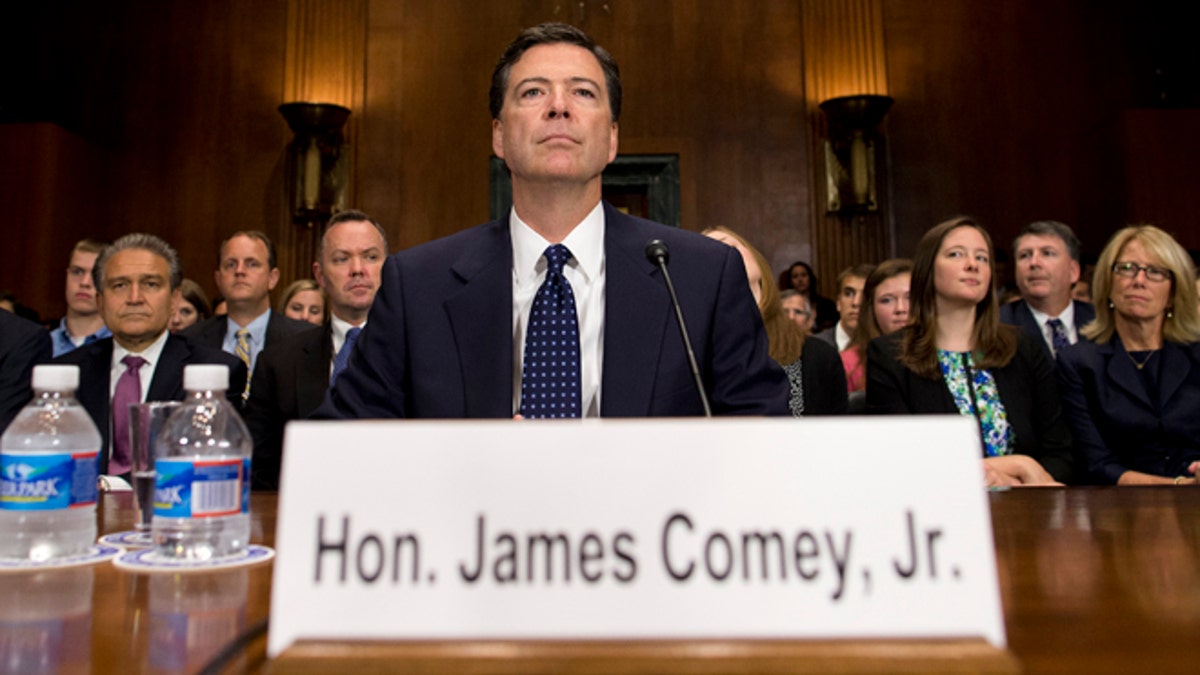
FILE: July 9, 2013: FBI Director James Comey during a Senate confirmation hearing, in Washington, D.C. (AP)
The Senate overwhelmingly confirmed James Comey on Monday to become FBI director, elevating the one-time Justice Department official who defied efforts by President George W. Bush's White House to renew a program that allowed warrantless eavesdropping.
Comey was approved 93-1 after one of the Senate's leading conservatives abruptly ended delaying tactics that had blocked a vote on the nomination.
Sen. Rand Paul, R-Ky., mentioned as a possible 2016 GOP presidential candidate, had been thwarting the vote over his concerns about the FBI's domestic use of drones. Minutes before a showdown vote that seemed likely to force an end to his delays, Paul announced he would allow a vote on Comey, saying he'd received a letter from the FBI that answered his questions about drones.
That letter said the FBI has seldom used drones and cited Supreme Court rulings that the agency said suggested that court warrants are not needed for aerial surveillance.
Paul was the only "no" vote.
President Barack Obama nominated Comey, 52, in June. He will succeed Robert Mueller, who is stepping down in September after 12 years heading the agency.
"In the face of ever-changing threats, he has repeatedly demonstrated his commitment to defending America's security and ideals alike," Obama said in a written statement about Comey.
Comey was the Justice Department's No. 2 official from 2003 to 2005 under Bush. He gained attention during a brief stint as acting attorney general in 2004, when he and Attorney General John Ashcroft, who was ill, rejected an effort by White House Chief of Staff Andrew Card and White House counsel Alberto Gonzales to have Justice renew a program that allowed eavesdropping without court warrants of domestic phone calls and emails.
With the Obama administration under fire following recent revelations about the National Security Agency's collection of records of domestic telephone calls and online communications, that 2004 episode and Comey's credentials of serving under a Republican president helped make him an attractive candidate for the top FBI job.
"James Comey proved that his reputation for unwavering integrity and professionalism is well-deserved," Senate Judiciary Committee Chairman Patrick Leahy, D-Vt., said during Monday's brief debate.
Leahy expressed concerns about Comey's approval in 2005 of a legal memo that he said authorized the use of torture, including waterboarding, in which water is poured onto a suspect's face to make them feel like they're drowning. But Leahy cited Comey's answers at a committee hearing this month, when Comey said the FBI would not allow abusive treatment of prisoners.
Comey was praised by the Judiciary Committee's top Republican, Iowa Sen. Charles Grassley, who called him "a fine choice."
Monday's vote led off a week in which majority Democrats were hoping to push a parade of nominations through the chamber. Among them were President Barack Obama's picks of Samantha Power as U.N. ambassador and B. Todd Jones to head the Bureau of Alcohol, Tobacco, Firearms and Explosives, for which votes on ending delaying tactics were expected Wednesday.
This is Congress' last week before its five-week summer recess.
Before rising to Justice's second-highest job, Comey was a federal prosecutor for 15 years.
Paul had threatened for weeks to block Comey's nomination until the FBI reveals more details about its use of drones in the U.S. He had written three letters to the FBI since June, seeking details on the agency's use of drones and the policies it follows in deploying them.
The agency's latest response, sent Monday, said the FBI has used drones 10 times since 2006 for surveillance in kidnappings, search and rescue missions, drug and fugitive investigations. Among them was last winter's standoff between authorities and Jimmy Lee Dykes, who was shot to death after holding a 5-year-old boy hostage in an underground bunker in Alabama, the letter said.
The letter, from Stephen D. Kelly, the FBI's assistant director of congressional affairs, said the agency doesn't use drones for general surveillance unrelated to specific investigations. An earlier FBI letter said none of its drones have been armed.
Monday's letter said the FBI's use of drones must comply with constitutional privacy protections and agency guidelines and meet "the definition of a reasonable expectation of privacy provided by the Supreme Court."
However, the letter said that while the top court has not ruled on the use of drones, prior rulings on aerial surveillance held that court warrants were not needed because the areas monitored were open to public view and "there was no reasonable expectation of privacy."
The agency also wrote that a warrant would not be needed because drones don't physically trespass on private property.
"I disagree with this interpretation," Paul said in a written statement. He said he agreed to allow the Comey vote "given the fact that they did respond to my concerns over drone use on U.S. soil."
Democratic leaders were hoping the Senate would confirm three Democratic nominees to the five-member National Labor Relations Board on Tuesday: Mark Gaston Pearce, the board's current chairman, and Kent Hirozawa and Nancy Schiffer, who have both been long-time labor lawyers.
Votes on ending procedural delays against the nominations of Power and Jones were expected Wednesday. Supporters will need 60 of the Senate's 100 votes to remove those procedural roadblocks.
Votes also seem likely this week on two Republican nominations to the NLRB: Chicago attorney Philip A. Miscimarra and Los Angeles lawyer Harry I. Johnson III, who have both worked with employers on labor issues.




